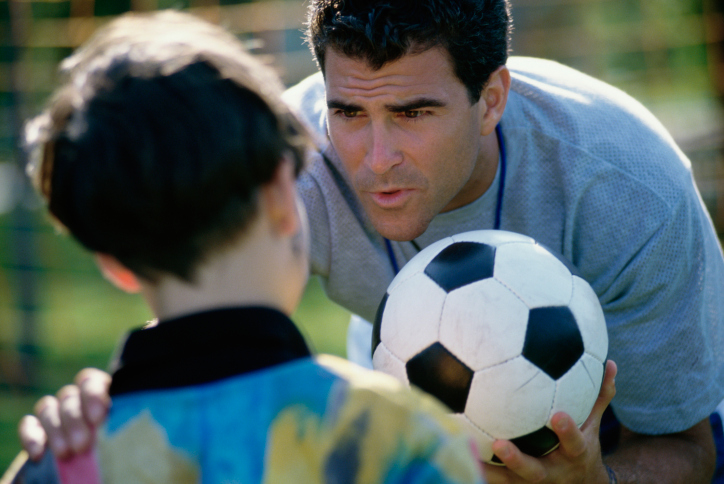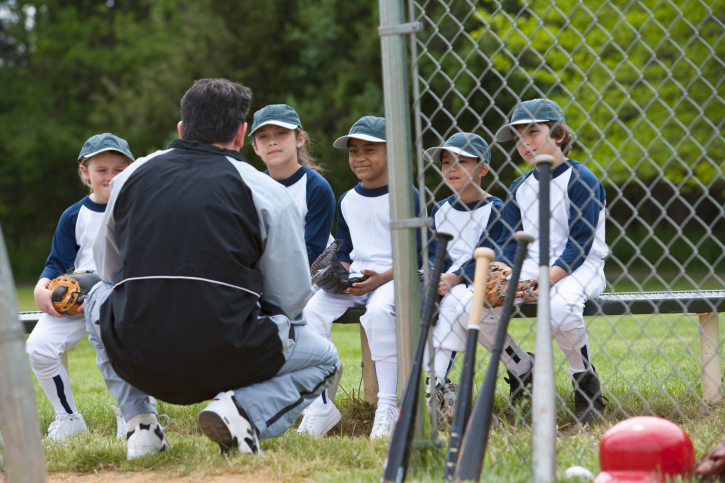“Dad, am I a disappointment to you?” My son asked, choking back tears.
I stopped dead in my tracks.
We were walking out of a local amusement park on our way to the car. We had spent the day at the park to bond. It seems the plan backfired.
I gathered myself. Inside I was screaming. Why does my son think he is a disappointment?
“Why would you ask that?”
He stopped walking too. “Because I did not follow in your footsteps. I don’t play soccer and I am definitely no daredevil like you. I’m not following in your path.”
I had spent the better part of the day trying to talk him into riding the roller coasters with me. Twice I got him part way through the line before he changed his mind. The rest of the time he flat out refused to ride them.
I love roller coasters. They were not his thing. No matter how much I pleaded with him, he would not try.
It isn’t only roller coasters. He’s grown up hearing the stories and seeing the pictures of my adventures. I’ve been known to enjoy a crazy adventure or two in my day. I swam with manatees in Florida. I was a ski bum (no joke!) and skied the back country bowls of Utah at 3 am during the brightest moon in 100 years. I traveled all over the Swiss Alps, I accidentally scuba dove with an alligator – long story. I’ve driven across the country, twice, and apparently there are still a few stories being told about me at my Alma Mater.
I didn’t always seek it, but I always embraced every adventure that came my way. Trust me, I didn’t make the safe decisions or the right ones. I have the scars and the aches to remind me, but I ran headlong into every adventure with reckless abandon.
My son is a bit more calculated, thoughtful, cautious. He dips his toe in the water, whereas I would dive in head first. I remember him crying wildly on the swings, while his younger brother would giggle uncontrollably next to him.
He tried soccer. I don’t recall seeing him ever play without a smile, but he also did not have a competitive nature. He enjoyed playing. He had fun. He cheered everyone. He could care less if he won or lost.
When I say he cheered everyone, I mean everyone. He was once nicknamed the “escort” because he would run alongside all the other players during tryouts telling them what a good job they were doing. Can you imaging trying out with someone escorting you up and down the field? Imagine your own personal cheering section?
He loved the idea of playing. Of being like his dad, but in the end, it was not for him. He chose to quit soccer.
Here we are. Standing in the parking lot of an amusement park. Him looking at me with his deep brown eyes, searching for connection. Me staring back, with tears welling up in mine, searching for words.
“Soccer? Daredevil? Dude, that is all me. You don’t have to be like me.” I stated calmly, as I began to walk again.
He refused to move. “But you always say I’m mini you. If I’m mini you, then I should follow your legacy.”
That one went right to the heart. Direct hit.
He was using my language. I speak a lot about legacy in my work on team culture. We should strive to create echoes we’ll never hear, resonating generation after generation. That is a true and worthy legacy.
He was using my favorite word – legacy. Why would he think his lack of soccer ability or his cautious nature would be a failure, though? What had I said and done over the years to make him think that way? Why was he trying to live up to my dreams?
The answer is simple. It is also painful. Whether I meant to do it or not, I had cast a shadow upon my son. He was living in a shadow of my life’s work, and worse, he felt compelled to live the same life. He either wanted to allow me to live vicariously through his new adventures or needed to fulfill the legacy he thought I expected to be carried into the next generation.
My son was trapped in the shadows. Thinking my expectations for him were unfulfilled. Believing he had failed me.
Over the years, I unwittingly created this situation. As I reflect on the way I’ve raised him I can see the moments when I trapped him in the shadows.
Here are the things we do to cast the shadow:
- We talk about the “good old days” as if life was better the way we did it. It was not better. We tend to forget the bad experiences and the struggles. Hindsight is 20/20 and when hindsight is looking back on our playing days, it’s always filtered through quite a rosy lens. Trust me, it was not better, just different.
- We tend to compare them to ourselves at their age. “When I was your age” should not be a phrase we use unless we are trying to show them how we struggled too. Comparing their sports prowess to what we did is ludicrous. We played in a different time, against different opponents, and with different conditions. The Olympics are done head to head for a reason. They are not done comparing historical scores.
- We use “I” way too much. “I am proud of you” “I want you to…”. Honestly, it simply isn’t about us. They should be proud of what they do and not worried about what us adults think. They should do the things they do because they want to and not because we want them to. Turn “I” into “you” and let them have a little ownership. This is their time to create their path.
- We Facebook their lives as if they were only born to be vehicles for bragging rights. My son was not born to this world so I could post all about his accomplishments on Facebook or Twitter. I love to brag about my kids just as much as the next person, but at some point in time I came the realization that he based his identity on what I said. He started asking what I would post after games, or asking me not to post certain things. Wow. Even he worried.
- We ask them about results. This sounds inane, but it has a very negative effect. I was a goal scorer, and everyone, myself included, shared the stories of my goal scoring prowess with my children. I always tended to ask my son f he won or if he scored. Every time I asked him if he scored, he thought the only way I would love him is if he scored like I did. My line of questioning set an unwanted expectation. He thought he needed to be like me to be loved by me.
We can correct course and help our children find their own paths. We can stop living through them or setting them up to think they have to fulfill our legacy. We can give the game back to them to let them carve their own path. A few simple adjustments in how we interact with them can go a long way for setting a change of course.
- Celebrate everything – I would get excited about the things that interested me. When he played soccer, and scored, I was over the moon. Soccer is my groove. When he got excited about promotion at Civil Air Patrol, I did not celebrate as wildly. Not because I did not care about him or the accomplishment, but because I knew nothing about Civil Air Patrol. It was not my groove. Our children know when we are not excited for them, and we send an unspoken, but crystal clear, message when we don’t celebrate their passions. We have to celebrate the things that excite them too in order to encourage a departure from our shadow.
- Be patient – They will not find their path easily or quickly. They will also change the path often. Be patient and understanding with your children as they find out who they are. Forcing them will only impose your will and not incite their passion.
- Stop comparing them to your fairy tale past – The more I compared my son to the skewed fairy tale me, the more he thought he needed to follow my path. The harder he tried and failed, the deeper he sank into that quagmire of self-doubt. This isn’t a comparison, it’s a new path. Besides, what we recall about our glory days is a lot like a the old fishing stories – the fish get bigger each time we tell it.
- Let them write their story – We tend to write the book of life for our children. Every. Step. Of. The. Way. Hand them the pen once in awhile and let them write a chapter. Ask them what they want to do and what they dream of.
- Encourage them to seek their passion – Even if they don’t follow our path, they want our permission to follow their own. Do not be afraid to encourage your children to find their love. When my son showed interest in video games, as much as it drove me nuts to think he would waste days in front of the TV, I had to encourage that as possibly his path. I encouraged him to study software development, design, animation, and more. The boy now creates web pages and wrote a software program for one of his school projects. I don’t do that. He is no longer in my shadow.
- Tell them you love them for who they are not what they do – If we shower them with love when they are only doing specific activities, we set them up to think they need to do that to get love. What they do is not who they are. I had to learn to stop introducing my children as the bowler, or soccer player, or straight A student because that told them I loved them for what they did. I love my kids because of who they are. I love them in my shadow or in their own sun. I simply love them, and I hope they now know that. I don’t love them for what they do.
- It is your responsibility to find common ground – Do not force them to find something for bonding. My wife said, “If you go to a dinner party and force everyone to talk about what interests you, you are a bore and won’t get invited back next time.” It is not our kids’ responsibility to talk about what we want or find common ground with us. We must be willing to find out what makes them tick and be with them in that common space. If you are willing to enter their world, they will feel empowered to pave that path.
If our children spend their lives following our footsteps, they will always be in our shadow. No person should ever live in the shadow of another.
If a person can’t see the sun, she is trapped in the shadows of someone else’s path.
We were meant to walk our own path. Our role as parents is to teach our children to step out of our shadows and walk where they can always see the sun on the horizon, like a beacon guiding the path.
Tell your child to blaze their own path, and never let anyone else cast a shadow on that path.
That day at the park I was not so eloquent. I looked at my son and said,
“Son, soccer and roller coasters and such were my path. I picked that path and walked it already. You were never meant to walk my path. You have to find your own and stop walking my path. Besides, if you follow me, the view never changes.”
He shook his head. “You’re so weird, dad.”













Comments